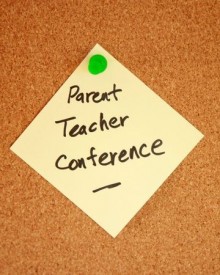You may just be starting school or you may be in full swing. Either way, it's important that you start your relationship with your child's teacher on the right foot.  Research indicates that family engagement is a key factor when it comes to a child’s academic success. Make the most of your time when you first meet the new teacher or during Parent-Teacher conferences by doing your homework and showing up prepared with questions and talking points that are relevant to you and your child.
Research indicates that family engagement is a key factor when it comes to a child’s academic success. Make the most of your time when you first meet the new teacher or during Parent-Teacher conferences by doing your homework and showing up prepared with questions and talking points that are relevant to you and your child.
- Make a list of your questions. Sometimes we have a whole list of topics and questions that we’re thinking about, but when we’re put on the spot we can’t recall any of them. Write down your questions to use as a reference during your meeting.
- Write down your child’s strengths and weaknesses. Having an open discussion about your child’s strengths and weaknesses can bring valuable insight to your child’s teacher that she might not have witnessed in the classroom. Also share specific rewards and motivations that you use at home.
- Review your child’s work, grades and progress reports. Pay special attention to teacher communications sent home and how your child has been progressing so far. Walk into the meeting prepared with specific questions or items you want feedback or clarification on.
- Keep the lines of communication open. Ask the teacher about communication preferences. Is he/she available after hours to talk about your child’s progress? Or maybe email works better? Be sensitive to a teacher's schedule and workload when asking for support - praising a teacher's strengths goes a long way in building good rapport.
- What support services are available? How does she handle it if your child needs some extra help? If your child does need extra assistance, what is the school's Response to Intervention process? Is afterschool support available?
- Ask about your child’s reading progress. Although you may have a good idea if your child is reading on grade level (or not), find out about the specifics of your child’s reading skills. Some questions to ask include: When working in a small group with my student in reading, what is an area of strength or weakness that you notice? How is my child’s decoding? Fluency? Comprehension? Vocabulary? How can I help support these reading efforts at home?
- Don’t forget to ask about cognitive skills! Cognitive skills are the foundation for all learning, which makes this conversation so important. Some questions to ask include:
How would you say my child is doing, as compared to peers, in these areas:
Memory: How well does my child learn and remember new information? Does he or she require more or less support than peers? How easily is information retained?
Attention: How is my child’s attention during different types of activities? One-on-one? Small group? Whole class?
Processing: How well is my child able to “make connections” as compared to peers? In reading, is my child decoding new words, making educated guesses about the meaning of a new word, using background knowledge, or predicting and inferring? In math, is my child showing signs of struggling during computations or retrieving simple number facts? In writing, is my child generating coherent ideas without a lot of support and putting them into words?
Sequencing: How well is my child able to organize his thoughts for writing or explain his understanding of a new concept?
8. How about social skills? Find out how your child interacts with other students in the classroom. How is he without direct supervision? How does he handle conflict with other students? Ask about how you can help to improve his social skills at home.
9. Find out about State Testing & Advancement. Is there a schedule available? Ask your child’s teacher if they have any concerns about your child’s ability to prepare for and take the state tests.
10. Ask how you can help support your child’s academic success (and how you can help support the teacher!). Are there specific ways you can stay informed about what your child is currently learning in school? Can you carry those lessons through in your day-to-day activities with your child? Some teachers have websites to keep parents in the loop; some may send newsletters home or have a specific bulletin board or binder you can check in the classroom. Coming to your teacher with supportive questions can go a long way. Keep in mind that teachers are under significant pressure and it goes a long way to acknowledge what they're doing for your child and the others in their class. You are on the same team!
In addition to this list, you can print out our Top 10 Brain-Based Questions for Your Child's Teacher. If you have any concerns about your child falling behind or about his academic performance before Parent-Teacher Conferences, don’t wait! Contact your child’s teacher right away and arrange a meeting earlier.
Having an open line of communication with your child’s teacher is so important, both to your child’s academic success as well as to your involvement in your child’s academic career. You may also find out about parent volunteer opportunities and planned field trips, so that you can see how your child interacts with his or her peers and teachers in a natural setting. Take advantage of this opportunity to work together with your child’s teacher to set him up for a successful school year!


Comments
great tips
Glad you liked them!